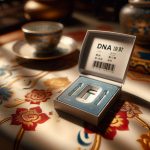In recent times, the demand for genetic testing within the healthcare sector has seen a significant upsurge. This growth underscores the pivotal role played by Genetic Counselors, who are indispensable to the thriving genetic testing field. To gain deeper insights into their contributions and the value of genetic testing, we had an enlightening conversation with Gillian Hooker, the President of the National Society of Genetic Counselors.
These professionals stand at the crossroads between cutting-edge science and personalized care, guiding individuals through complex genetic information. Their expertise ensures that patients not only receive accurate test results but also understand what those results mean for their health and well-being.
Moreover, as technology evolves and brings new advancements in genetic testing, these counselors become ever more crucial. They are not just interpreters of scientific data; they are compassionate advisers helping people navigate tough decisions about their health futures.
The surge in interest around genetic tests speaks volumes about its perceived value in enhancing healthcare outcomes. It’s clear that without these skilled counselors, making sense of our genetics would be a far more daunting task for many.
What does The National Society of Genetic Counselors do?
For over four decades, the National Society of Genetic Counselors (NSGC) has stood at the forefront of supporting and enhancing the genetic counseling profession. This esteemed organization not only champions this specialized field but also fosters a sense of unity among its practitioners. It’s dedicated to both the professional development and personal growth of genetic counselors, ensuring they have access to continuous educational resources.
Joining NSGC is an option open to all genetic counselors seeking additional support and resources, although it’s notable that a significant majority—about 80%—of certified counselors in the U.S. choose to be part of this community. This high membership rate underscores the value that professionals see in being connected with NSGC.
Moreover, NSGC thrives because of its vibrant volunteer community, with over a thousand members actively contributing their time and expertise to various initiatives within the organization. This enthusiastic participation highlights how committed members are towards advancing their field and supporting each other. Through such collaboration, NSGC continues to be a pillar for those dedicated to genetic counseling across America and beyond.
Why is genetic counseling crucial in the field of genetic testing?
Genetic Counselors play a pivotal role in guiding individuals through the maze of genetics and health. Their primary goal is to demystify how our genes can influence diseases. This isn’t always about running tests; sometimes, it’s more about having meaningful conversations or digging into family history.
Before anyone decides to undergo genetic testing, these counselors are there to light the way. They help sift through family stories and medical records to decide if testing is necessary and, if so, which tests might yield the most valuable information. They’re like navigators, ensuring you know what you’re signing up for and what those test outcomes could mean for your life.
But their support doesn’t end once the results are in. Post-test scenarios often find people with a barrage of questions or facing emotional struggles they hadn’t anticipated. Whether it’s immediate concerns post-testing or future worries that crop up as life unfolds—such as when children start asking tough questions or other relatives become curious—genetic counselors stand ready to assist.
What makes this profession truly remarkable is its flexibility across time. It’s not just a one-and-done deal; whether you’re looking at genetic factors now or years down the line, these experts remain an invaluable resource throughout various stages of life. In essence, Genetic Counselors offer a helping hand from start to finish—and everywhere in between—in navigating the complex interplay between our genes and our health.
Is there a growing interest among individuals in understanding their genetics and health?

The interest in genetic testing has significantly grown, with more individuals turning to it for insights into their personal health and ancestry. These tests offer a window into one’s genetic blueprint, potentially guiding decisions related to health management. They’re not just about predicting medical futures; they also satisfy curiosity about one’s roots and familial ties.
Alongside this surge in test popularity comes the need for genetic counseling. It’s no longer enough to simply receive your results; understanding them is crucial. People are increasingly seeking expert advice on how to interpret these findings and apply them practically in their day-to-day lives. This blend of science and personal advice helps bridge the gap between complex genetic data and actionable knowledge.
In essence, as we delve deeper into our DNA, the role of knowledgeable guides becomes indispensable. They help demystify the science, making it accessible and meaningful for anyone looking to explore their genetic story.
What can genetic tests reveal and how might this alter lifestyles?
When diving into the world of genetic testing, individuals are often driven by two main motivations. On one hand, there are those fueled by curiosity and a thirst for knowledge about their own body’s blueprint, be it health risks they may face down the line or unraveling the threads of their ancestry. This group approaches genetic exploration with a sense of adventure, seeking to uncover more about themselves and how their genetics play into their overall health and where they come from.
On the other side of the spectrum are those looking for answers to more immediate concerns. These individuals might be navigating through personal or family medical histories sprinkled with question marks. Their journey through genetic testing is pragmatic, aimed at pinpointing specific treatments or gaining clarity on necessary medical steps forward, such as regular screenings for potential diseases hinted at in their genes.
The role of genetic counselors has become indispensable across numerous healthcare domains due to this growing interest in genetics. They serve as guides in prenatal settings, assisting expectant or hopeful parents in understanding potential hereditary conditions. In oncology, they help patients and families decode the genetic intricacies that could explain cancer occurrences within families and inform treatment choices based on genetic findings.
Another burgeoning field is cardiology, where sudden cardiac events within families can often be traced back to genetics; here too, counseling offers valuable insights on preventative screening measures. The realm of neurology has also seen an uptick in interest as individuals seek explanations for conditions like dementia through genetic lenses, a quest further spurred by clinical trials offering new hope.
Moreover, amidst the vast expanse of rare genetic diseases lies another significant cadre seeking understanding and community: those diagnosed with unfamiliar conditions turn to genetic counseling not just for comprehension but also connection—yearning to meet others walking similar paths.
In essence, whether driven by broad exploratory desires or targeted health queries rooted in familial experiences—individuals find themselves embarking on unique journeys through genetics seeking insights that bridge pasts with presents and carve clearer paths towards futures shaded with better-informed choices.
What worries you most about at-home DNA tests and their findings?
When diving into the world of Direct-to-consumer (DTC) genetic tests, it’s a mixed bag. A handful of these tests are top-notch, constantly refreshed with cutting-edge science. Yet, others lag behind, not quite making the grade in terms of investment in quality. It’s tricky to tell which is which. You might find yourself pondering whether a particular test offers comprehensive insights or if it barely scratches the surface, especially on critical health matters like breast cancer.
Moreover, even when no issues are detected by these tests, jumping to conclusions about being completely risk-free is a leap too far. The foundation underpinning genetic testing is always shifting—new discoveries emerge regularly. Thus, understanding a test’s limitations and ensuring it aligns with solid scientific principles becomes crucial.
Privacy concerns also loom large in this arena. Policies on how your genetic information is handled vary widely from lab to lab—some guard your data zealously while others might use it for research or drug development projects. Reflecting on what you’re comfortable with privacy-wise before taking a plunge is wise.
Another layer to this complex field is the impact on family dynamics and relationships since DNA doesn’t lie—and you share yours with relatives. Results can unearth unexpected familial connections or vital health information relevant not just to you but potentially beneficial or concerning for your kin as well.
Conversations sparked by such revelations may be tough yet necessary; they underscore an often-overlooked facet of undergoing genetic testing—the ripple effects through one’s family tree.
Navigating these waters isn’t something you have to do solo; genetic counselors stand ready to guide individuals through both the emotional and technical intricacies that accompany DTC genetic testing results.
What future trends and technologies are likely to emerge in genetic testing?
In recent times, the realm of genetic testing has seen fascinating advancements. These tests are not just about understanding one’s ancestry anymore; they’re playing a crucial role in medical science, particularly in the field of neurology. Here, cutting-edge research is making strides by leveraging these tests to determine eligibility for clinical trials. This development is groundbreaking because it opens up new avenues for individuals with certain genetic markers or hereditary conditions to access potentially life-altering treatments.
Moreover, there’s a noticeable shift towards proactive health management through genetics. Companies are increasingly investing in technologies that enable early disease detection. A prime example of this trend is the identification of cancer markers from blood samples long before traditional methods would catch them. This approach hints at a future where yearly genetic screenings could become as routine as annual check-ups, allowing for early intervention and significantly improving treatment outcomes.
This evolution in healthcare suggests a paradigm shift towards personalized medicine, where treatments can be tailored based on an individual’s unique genetic makeup. The implications here are profound, offering hope for more effective therapies and a higher quality of life for patients dealing with chronic diseases or those at risk due to family history.



















![DNA Glossary: Key DNA Definitions to Know [2024 Update] – Your Guide to Navigating the Complex World of Genetics 2024 DNA Glossary: Unlock the Secrets of Genetics](https://www.musterr.com/wp-content/uploads/2024/03/2024-dna-glossary-unlock-the-secrets-of-genetics-1709502590-150x150.jpg)
